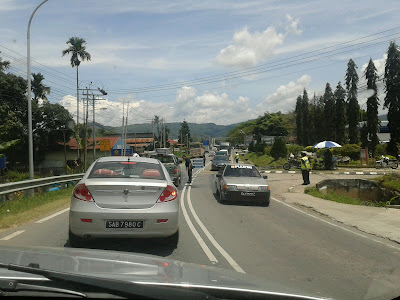The school year in Malaysia divides into two semesters a year, but beyond this fairly straightforward division, there's a secondary set of deadlines: the extra-curricular ones. At the beginning of 2013 was Sports Day - teachers responsible for the school's sports teams had up to a month off classes training and preparing the kids. First comes the zone competition - around ten schools competing in sports from badminton and football, to the South-East Asian sport sepak takraw. The winners move on to compete in the District competition, then regional, then state, and then, for a single school from the whole of Sabah, to national level.
Last week began the second deadline of the year: the Pesta Ko-Kurikulum (Extra-curricular Festival) - a sort of talent show for the kids. And being the local orang putih, I got asked to sit alongside the headteachers of my zone to judge the first phase of the competition.
It focuses on demonstration skills - singing, storytelling, public speaking, and so on. You would recognise most of that list from your own school days. Then we move on to the more diverse stuff. Like gong-beating, for instance. Nation-wide, there's also choral speaking, which is supposedly descended from something British people used to do, back in the dark days of Latin and grammar translation. Nobody I know has ever heard of it, but it's a really big deal in Malaysia - one of the main events of the Pesta.
Choral speaking is done in a large team of around 30 children aged 10 - 12. They literally speak in chorus. They can't move their bodies below the hips, and aren't allowed to use any additional props or materials, wearing only their school uniforms - relying on their voices to bring interest and liveliness to a set text. A single conductor stands at the front, usually wearing white gloves, leading the chorus with gestures and claps. It's impressive to watch when it's done well.
To do it well means a LOT of training for the kids. Most of my schools had almost no lessons last week, trying to prepare their teams. On Tuesday I got asked to help with the pronunciation of one of my school's teams - I did protest weakly that this might open me up to accusations of bias as a judge, but there was no refusing the school's headmistress, who is a fiery disciplinarian! (Also, as all the judges come from the zone's schools, they all have teams competing in each section, so really, I'm no more biased than the next judge...)
The next morning, they competed, still mispronouncing responsibility despite the two hours of pronunciation work the previous afternoon, and won! Not terribly surprising, as this group of kids is one of the few to seek me out at school to speak in English. Afterwards I got a big hug from the conductor, and a dirty look from a teacher at another school... ;)
My judging duties discharged for the day, I went to sit with one of my mentees, a preschool teacher, to watch another of the localised competitions - the taboi-aboi. This competition is only done up to district level, as it is performed in a local dialect of the Kadazandusun language, which isn't found outside Sabah.
The taboi-aboi is excellent. Done by a group of 8 to 10 children, it is based on local stories, usually about harvesting fish or rice. The children speak, sing, and act, all the while dressed in traditional costume. One of my schools used a story from a Kadazan tribe (generally Kadazans are lowland tribes, and Dusun are found in the highlands, while sharing very similar language and customs.)
They were so good that, despite the fact it was in a language of which I know two words ("Thank you", "You're welcome") I could follow the storyline.
The next day, I was back at 8am, ostensibly to judge the Action Song competition, but in reality to sit and wait for nearly two hours while they dealt with "technical problems." I took the opportunity to go and steal some hot Milo from the teachers from one of my schools, who were camped out in one of the classrooms, preparing their children for the contest.
Action Songs is open to Year 3 students. Now, I do know a lot of the Year 3 students in my schools, because they tend to be the ones that my teachers teach, and therefore I observe. But Action Songs just kills me: I cannot recognise a single one of them. This is why:
The make-up on these 9-year-olds might realistically be called "Extreme Make-upping." The classroom was a mass of teachers and parents applying deep shades of eyeshadow to the children.
The performances also involve props and costumes and the kids have a lot of fun, grinning their way through any song that could conceivably have appropriate actions to attach to it - Lion Sleeps Tonight is a popular choice every year, and a couple of schools chose Daddy's Taking Us to the Zoo Tomorrow as one third of their permitted medley. Some were a little more adventurous, and one school took for their theme "Happiness," with the little girls singing You Are My Sunshine to the little boys.
I've been trying very hard to imagine the equivalent ages in the UK performing the Morris Dance with glee on their faces, and am so far failing... :)










































